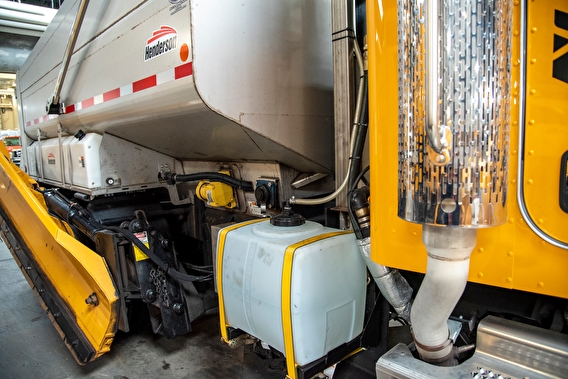The public works department for the City of Rochester received a Local OPERA Program grant to address brine system performance issues on plow trucks with saddle-mounted brine tanks. Staff decided to install a “nurse” tank, positioned lower on the truck than the saddle tanks and directly connected to the system pump, to eliminate sloshing problems.

The city’s brine system frequently ran into problems when the brine level in the truck’s side-mounted saddle tanks fell below the halfway point. The liquid sloshed around in the saddle tanks while the truck was in motion, particularly when traveling up or down the city’s hilly terrain, causing the system pump to draw in air and induce a controller error. This reduced efficiency and frustrated operators because the controller needed to be reset before resuming brine distribution.
Public works staff considered several options to solve the problem. One was to install a saddle tank with a sump at the bottom, but this proved too expensive. Another option was to install tank ballast balls, which would reduce sloshing but not prevent the system from sucking in air when the tanks were not level.
Department staff ultimately decided to install a nurse tank. Gravity ensures that the saddle tanks drain into the nurse tank to keep it full, which in turn eliminates problems caused by sloshing or steep inclines. The team first installed the nurse tank system on two prototype trucks for approximately $1,778 per truck in labor and materials.
As a result, plow operators using the system no longer need to take extra time to reset the brine controller, making their job more efficient and less frustrating. In addition, the department can utilize the full capacity of the brine in the saddle tanks and eliminate the extra time spent refilling the tanks before they are completely empty. Instead, operators can apply brine-treated salt throughout an entire plow event and use less salt overall, since wet salt better adheres to the road and leads to less waste. Wet salt also works faster and at lower temperatures than dry salt alone to melt ice and snow.
Moving forward, Rochester Public Works staff plan to install the brine nurse tank modification on all plow trucks less than five years old. They also plan to use more durable stainless steel straps to secure the nurse tank to the truck instead of the fabric tie-down straps used originally for testing the system.
Learn more: